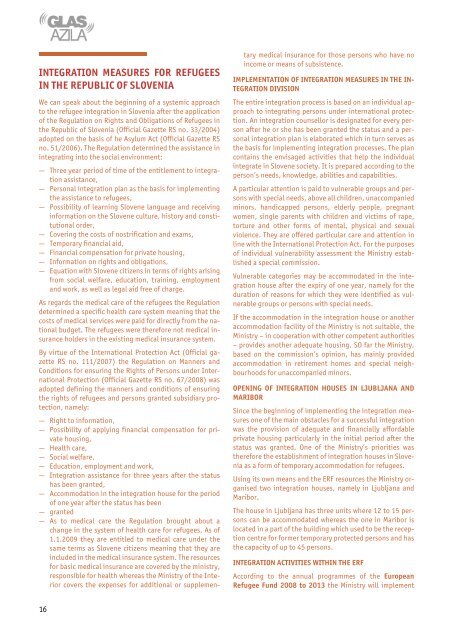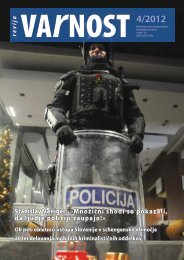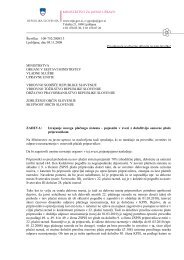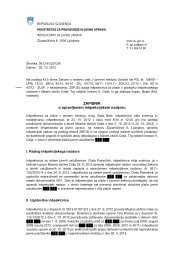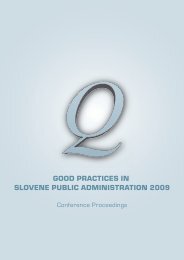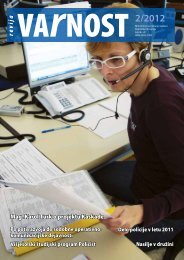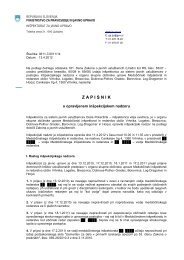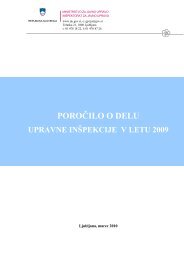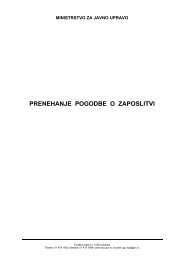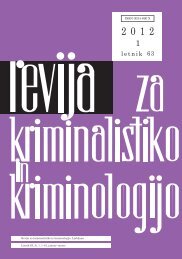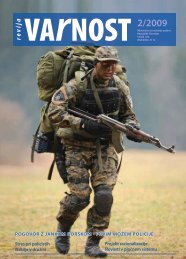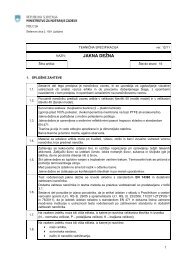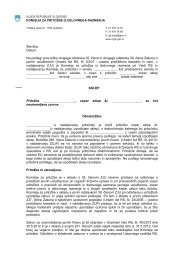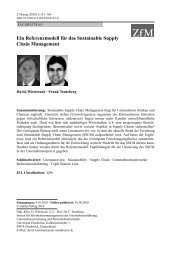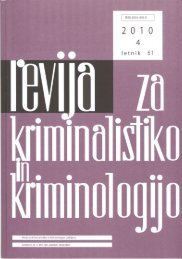glasilo st. 2.indd - Ministrstvo za notranje zadeve
glasilo st. 2.indd - Ministrstvo za notranje zadeve
glasilo st. 2.indd - Ministrstvo za notranje zadeve
Create successful ePaper yourself
Turn your PDF publications into a flip-book with our unique Google optimized e-Paper software.
INTEGRATION MEASURES FOR REFUGEES<br />
IN THE REPUBLIC OF SLOVENIA<br />
We can speak about the beginning of a sy<strong>st</strong>emic approach<br />
to the refugee integration in Slovenia after the application<br />
of the Regulation on Rights and Obligations of Refugees in<br />
the Republic of Slovenia (Official Gazette RS no. 33/2004)<br />
adopted on the basis of he Asylum Act (Official Gazette RS<br />
no. 51/2006). The Regulation determined the assi<strong>st</strong>ance in<br />
integrating into the social environment:<br />
— Three year period of time of the entitlement to integration<br />
assi<strong>st</strong>ance,<br />
— Personal integration plan as the basis for implementing<br />
the assi<strong>st</strong>ance to refugees,<br />
— Possibility of learning Slovene language and receiving<br />
information on the Slovene culture, hi<strong>st</strong>ory and con<strong>st</strong>itutional<br />
order,<br />
— Covering the co<strong>st</strong>s of no<strong>st</strong>rification and exams,<br />
— Temporary financial aid,<br />
— Financial compensation for private housing,<br />
— Information on rights and obligations,<br />
— Equation with Slovene citizens in terms of rights arising<br />
from social welfare, education, training, employment<br />
and work, as well as legal aid free of charge.<br />
As regards the medical care of the refugees the Regulation<br />
determined a specific health care sy<strong>st</strong>em meaning that the<br />
co<strong>st</strong>s of medical services were paid for directly from the national<br />
budget. The refugees were therefore not medical insurance<br />
holders in the exi<strong>st</strong>ing medical insurance sy<strong>st</strong>em.<br />
By virtue of the International Protection Act (Official gazette<br />
RS no. 111/2007) the Regulation on Manners and<br />
Conditions for ensuring the Rights of Persons under International<br />
Protection (Official Gazette RS no. 67/2008) was<br />
adopted defining the manners and conditions of ensuring<br />
the rights of refugees and persons granted subsidiary protection,<br />
namely:<br />
— Right to information,<br />
— Possibility of applying financial compensation for private<br />
housing,<br />
— Health care,<br />
— Social welfare,<br />
— Education, employment and work,<br />
— Integration assi<strong>st</strong>ance for three years after the <strong>st</strong>atus<br />
has been granted,<br />
— Accommodation in the integration house for the period<br />
of one year after the <strong>st</strong>atus has been<br />
— granted<br />
— As to medical care the Regulation brought about a<br />
change in the sy<strong>st</strong>em of health care for refugees. As of<br />
1.1.2009 they are entitled to medical care under the<br />
same terms as Slovene citizens meaning that they are<br />
included in the medical insurance sy<strong>st</strong>em. The resources<br />
for basic medical insurance are covered by the mini<strong>st</strong>ry,<br />
responsible for health whereas the Mini<strong>st</strong>ry of the Interior<br />
covers the expenses for additional or supplemen-<br />
16<br />
tary medical insurance for those persons who have no<br />
income or means of subsi<strong>st</strong>ence.<br />
IMPLEMENTATION OF INTEGRATION MEASURES IN THE IN-<br />
TEGRATION DIVISION<br />
The entire integration process is based on an individual approach<br />
to integrating persons under international protection.<br />
An integration counsellor is designated for every person<br />
after he or she has been granted the <strong>st</strong>atus and a personal<br />
integration plan is elaborated which in turn serves as<br />
the basis for implementing integration processes. The plan<br />
contains the envisaged activities that help the individual<br />
integrate in Slovene society. It is prepared according to the<br />
person’s needs, knowledge, abilities and capabilities.<br />
A particular attention is paid to vulnerable groups and persons<br />
with special needs, above all children, unaccompanied<br />
minors, handicapped persons, elderly people, pregnant<br />
women, single parents with children and victims of rape,<br />
torture and other forms of mental, physical and sexual<br />
violence. They are offered particular care and attention in<br />
line with the International Protection Act. For the purposes<br />
of individual vulnerability assessment the Mini<strong>st</strong>ry e<strong>st</strong>ablished<br />
a special commission.<br />
Vulnerable categories may be accommodated in the integration<br />
house after the expiry of one year, namely for the<br />
duration of reasons for which they were identified as vulnerable<br />
groups or persons with special needs.<br />
If the accommodation in the integration house or another<br />
accommodation facility of the Mini<strong>st</strong>ry is not suitable, the<br />
Mini<strong>st</strong>ry – in cooperation with other competent authorities<br />
– provides another adequate housing. SO far the Mini<strong>st</strong>ry,<br />
based on the commission’s opinion, has mainly provided<br />
accommodation in retirement homes and special neighbourhoods<br />
for unaccompanied minors.<br />
OPENING OF INTEGRATION HOUSES IN LJUBLJANA AND<br />
MARIBOR<br />
Since the beginning of implementing the integration measures<br />
one of the main ob<strong>st</strong>acles for a successful integration<br />
was the provision of adequate and financially affordable<br />
private housing particularly in the initial period after the<br />
<strong>st</strong>atus was granted. One of the Mini<strong>st</strong>ry’s priorities was<br />
therefore the e<strong>st</strong>ablishment of integration houses in Slovenia<br />
as a form of temporary accommodation for refugees.<br />
Using its own means and the ERF resources the Mini<strong>st</strong>ry organised<br />
two integration houses, namely in Ljubljana and<br />
Maribor.<br />
The house in Ljubljana has three units where 12 to 15 persons<br />
can be accommodated whereas the one in Maribor is<br />
located in a part of the building which used to be the reception<br />
centre for former temporary protected persons and has<br />
the capacity of up to 45 persons.<br />
INTEGRATION ACTIVITIES WITHIN THE ERF<br />
According to the annual programmes of the European<br />
Refugee Fund 2008 to 2013 the Mini<strong>st</strong>ry will implement


